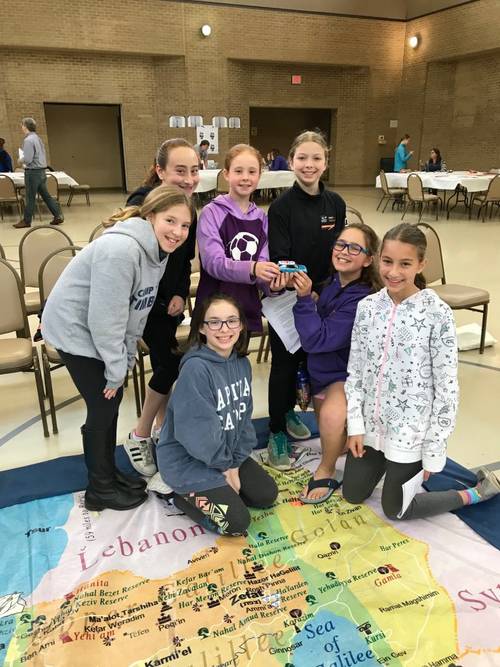- Worship
- Education
- Lifecycle
- Events & Programs
- About Us
- Join Us
- Donate
Talmud Torah Religious School
Primary & Intermediate Schools (Grades K-6)
B’nai Israel Talmud Torah’s Primary and Intermediate School (grades K–6) aims to engage children in an exploration of Jewish texts, history, practices, beliefs, and Jewish values that are meaningful in the present and will be the foundation for a lifetime of participation in Jewish community.
Our Mission
 Develop a positive Jewish identity;
Develop a positive Jewish identity;- Encourage and support curiosity into the nature of being and living Jewishly;
- Teach students to utilize Jewish texts for personal enrichment;
- Promote Jewish skills, ideas, and values;
- Develop a personal system of ethics founded on Jewish tradition and history;
- Provide a framework for living as a Conservative Jew; and
- Inspire a lifelong connection to Israel.
Curriculum FAQ
What does the curriculum cover?
- Our integrated curriculum covers Hebrew language, tefillah (prayer), synagogue skills, history, Torah, traditions, rituals, mitzvot, Jewish values, culture, and Israel. Our program heavily emphasizes a social emotional and spiritual approach to education. Teachers are trained to create Kehillah, community, through a socially aware classroom atmosphere. SEL (Social Emotional Learning) focuses on developing self-awareness, self-management, social awareness, relationship skills, and responsible decision-making. For more information on SEL please visit www.casel.org.
- Read our brief summaries of the curricula for each grade:
How does SEL (Social Emotional Learning) impact the students?
- Following SEL means that our teachers approach their lessons by incorporating cooperative learning, project-based learning, and small group learning. Combined with experiential learning, each child is fully engaged and connected with peers allowing for Kehillah, community, to be at the center of the learning experience.
What does your school day look like on Sundays? Tuesdays? Why do 3rd-6th graders attend for five hours per week?
- Kindergarten and 1st Grade meet Sundays from 9:00-11:00 AM with an optional one hour chug, workshop, from 11:15 AM-12:15 PM for those interested in a longer day. The chug programming allows us to incorporate additional art, storytelling, drama, dance and more into the school day. 2nd grade meets on Sunday mornings from 9:00 AM -12:15 PM. On a typical Sunday, students would arrive in their classrooms and start with Kehillah, community time. For Judaics, we use the Beverly Goldstick z"l Curriculum for 21st Century Learning. The schedule is not identical each week but generally includes a hands-on lesson, Hebrew Through Movement, Tefillah and Music.
- 3rd through 6th graders have two classes, Judaics and Hebrew. Judaics classes follow a curriculum by grade level and our Hebrew classes focus on acquisition of Hebrew reading and prayer skills. Students rotate between those classes and go to Tefillah and Music. In the 5th and 6th grades, students also have classes in Trope, Haftorah and Torah chanting, taught by Cantor Sarah Bolts. 3rd-6th Graders meet on Sundays from 9:00 AM-12:15 PM and on Tuesdays from 4:30-6:30 PM.
Can you explain how your Hebrew program works?
- We focus on meeting our students where they are- our program is for all levels of learners. We have a well-defined resource program that supports the individual needs of all our students. This includes integration (with support, if needed) of students with a variety of learning challenges; Hebrew Through Movement for our Primary students, an enriched Hebrew program for highly motivated, linguistically gifted students in grades 3–6, and pullout tutoring for students who need additional help.
- We utilize our teen madrichim to facilitate small group learning in Hebrew in grades 3-6.
How will I know if my child is learning enough Hebrew? I want them to be able to be a full participant in services.
- Students’ Hebrew skills are evaluated by the Hebrew teachers and our Hebrew specialist beginning in 3rd grade. If a student needs extra help, they will receive it, either in class or with pullout tutoring.
- We have a prayer mastery incentive program (the Gold Kippah Honor Society) that recognizes students’ achievements as they progress. Children earn “Shabbat Bucks” for attending Gold Kippah and Family Minyan, which may be exchanged for fun prizes monthly on Birthday Shabbat.
Are children required or encouraged to attend Shabbat services outside of religious school?
- The only way to become familiar and comfortable with Jewish prayer is to make it a regular part of your family’s life. We strongly encourage families to regularly attend the different Shabbat services which B'nai Israel offers. Joining us for Shabbat Youth & Family Services is an important way to cultivate a deep connection with prayer, synagogue life, and Jewish identity. Regular attendance on Shabbat helps you and your children feel a part of our Kehillah, community, and allows for a greater familiarity and level of comfort with the different parts of the service. Regular attendance on Shabbat ensures that children are familiar with the service before beginning their b'nai mitzvah tutoring.
- B’nai Israel has Family Minyan services on Shabbat most weeks of the school year, where students get the chance to help lead prayers. Students in each grade lead part of our Family Minyan services at least once, focusing on the tefillot, prayers, that they have mastered. This encourages practice, community building, and pride in achieving mastery of those prayers. Attending Family Minyan allows students to participate in a smaller service that is geared towards families with similarly-aged children. Teens can continue their connection through Teen Minyan, which meets at least monthly during the school year. These teen discussions and prayer are for the post-B’nai Mitzvah teens of B’nai Israel. Our teens help to decide the topics and lead it in conjunction with B'nai Israel staff.
I want my child(ren) to do more than just sit in class. What else do you offer?
- We have regular Music and special programs, led by specialists on our staff as well as guest instructors.
- Curriculum-based special programs, such as making a shofar before the High Holidays or having a Tu B’Shevat seder.
- Each grade will take part in at least one Family Education Program per year.
Please contact Talmud Torah Principal Dafna Spear with any questions.
talmud torah resources
Click here for a list of important dates for the 2024–2025 school year.
Fri, October 25 2024
23 Tishrei 5785
2024-2025 opening days
September 3 - First Tuesday Grades 3-6
September 8 - First Sunday K-6
September 10 - Noar B'Yachad Begins
TALMUD TORAH CALENDAR
Click here for the 2024-25 Talmud Torah calendar.
Grade Shabbat Dates 2023-2024
Kindergarten – November 18, March 16
First Grade – December 2, February 10
Second Grade – December 16, April 20
Third Grade – December 9, May 11
Fourth Grade – October 14, May 4
Fifth Grade – October 21, April 13
Sixth Grade – October 27 and 28 (B’nai Mitzvah Experience), January 27
Early Dismissal Form
Please complete this online form for early dismissals. We appreciate your submitting the form by 9:05 AM for Sundays and 4:00 PM for Tuesdays.
inclement weather policy
Click here for information.
Join Our Mailing List
We are accessible

B’nai Israel is proud to be accessible to all.
Large print siddurim, assistive listening devices and page magnifiers are readily available. Our entire building and grounds are wheelchair accessible. We can provide sign language interpreters upon request and subject to availability.





